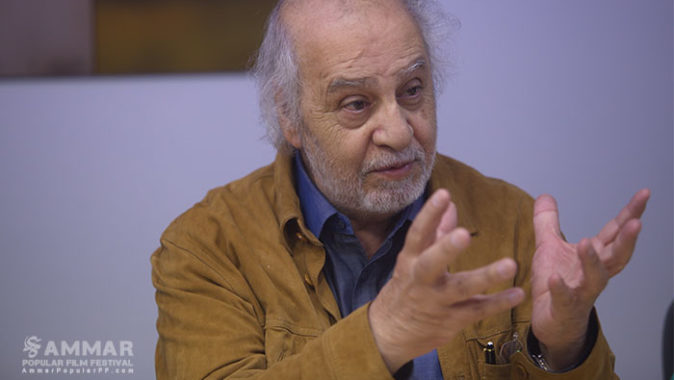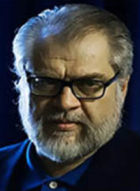TEHRAN (AIPFF) - Miguel Littin, the well-known Chilean anti-coup film maker, said: "when Ammar Film Festival was introduced, he remembered many works he had done in Chile and Cuba due to the Iranian festival’s strong similarity with the festivals."
TEHRAN (AIPFF) – Miguel Littin, the well-known Chilean anti-coup film maker, said: “when Ammar Film Festival was introduced, he remembered many works he had done in Chile and Cuba due to the Iranian festival’s strong similarity with the festivals.”
Littin said , “The popular cinema can express and present many things because people are the main eyewitness of events and only they can show the events.”
In a meeting with certain AIPFF organizers, Miguel Littin introduced himself and told the audience surprisingly, “We share common points and similarities on many things and the reason is our revolutionary and right beginning.”
He emphasized many similarities between Chilean anti-coup cinema and Ammar Popular Film Festival and said, “We share common goals, including our belief that one can build links between people and cinema, and use cinema as a tool for popular campaign to the extent that even people themselves are dragged to the direction to use the arm of cinema for their own goals.
He said for instance, in Cuba films of Charlie Chaplin are screened for people who watched it for the first ever in their life.
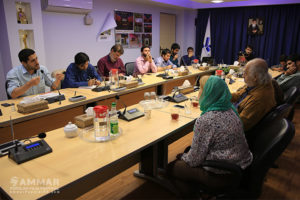
Miguel Littin in meeting with certain AIPFF organizers – Photo: Taha Jalilzade
The famous Chilean filmmaker says certain religious monks in Chile and Latin America used to show films for people who lived in forests to attract fans; even once, the Christian Liberation Federation asked me to give them one of my films to copy it and screen it because their films were useless and not worthy of broadcasting due to much screening.
Littin said in Chile, there are film directors and filmmakers who go to people in various cities and speak to them and make films based on their needs; we even had festivals that were not so much famous in Santiago, the capital of the country, but like AIPFF, their films were on the show in various parts of the country like hospital, school, and church.
He added that after the events, a feeling began to arise that there was a need to change the official and industrial cinema into popular cinema because people wanted to make films about themselves and their lives.
The Latin American anti-coup filmmaker said popular cinema can reveal and present many things because people are the main eyewitnesses of the events and only they can display them properly.
He provided the chronology of his filmmaking and said in 1960, when former Chilean President Salvador Allende was in office, the first thing he did was to set up popular educational workshops with such aspirations like Ammar Film Festival’s goals so that cinema will be extended all over the country and filmmakers will produce works with people being their axis.
Littin explained that in the popular workshops various arts like theatre, music and architecture are taught because in the workshops filmmakers turn into cultural figures.
He added, “For a person to turn into a good film director and artist, he should be well-informed of people from various walks of life not just knowing how to shoot pictures of some scenes.”
The Chilean filmmaker said a filmmaker must be familiar with different fields of studies to be able to show realities as an artist.
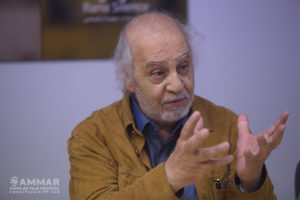
Miguel Littin in meeting with certain AIPFF organizers – Photo: Taha Jalilzade
Littin noted that the works they had started when Allende ruled, continued for nearly 1000 days and until the time of the coup. But this short period of time helped them to have such filmmakers as Sebastian Alderson and Patricio Gazman to fight the dictatorship of the government of Pinochet and this way, the campaign cinema continued to exist.
He asserted, “For the time being, in Chile there is an audio-visual institute which is affiliated to the state university and like the era before the coup, we seek the film directors and filmmakers who could show realities of public life and screen films in various places.”
The anti-coup filmmaker said, “Besides filmmaking, we wish to learn new language of cinema in the research and education parts; additionally, we are in contact with people through a TV network and broadcast the works people sent after coordinating with them.”
Littin said since receiving the invitation from Ammar Popular Film festival, he had thought of conclusion of contracts for cooperation. He asserted, “Despite the similarities, we should think of initiatives and creativity so as to be able to create a campaign cinema worldwide.”
In reaction to the assertions of the Chilean well-known filmmaker, member of the Policy Making Council of Ammar Popular Film Festival Mohsen Safaiefard said, “Such talks will bring people-run cinema organizations closer together and then it will end up in globalization of the campaign cinema; due to the same reason, such contacts should continue, especially given that there are still many words remaining to be said in this regard.”
Referring to Ammar Statue of Lantern, he said, “Young filmmakers of Ammar Film Festival represent people and clear ambiguities like lantern which enlightens the dark places; they may also introduce the popular heroes who are not seen; due to the same reason, Ammar cinema always has some unexpected things.
Safaiefard said many similarities between Ammar Film Festival and Chilean campaign cinema show that world revolutions have lost much time for uniting; on the other hand, many essential concepts like justice seeking, and right seeking are pretty close to each other; so, they should soon get coordinated and united, while removing obstacles.
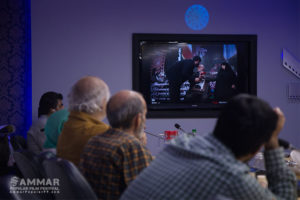
Miguel Littin in meeting with certain AIPFF organizers – Photo: Taha Jalilzade
Based on the report, prior to the session, Miguel Littin along with film directors and producers watched clips of “We are Standing I and II” at the Arts Bureua and after watching the two clips, they raised the question: “Who are these two films directed at, especially “We are Standing II””. Turning to the works’ producers, Littin said: “In such works, usually there is so much concentration on special effects, doing away with the main reason for making such films that is, in this case, the attack of American navy to Iranian plane.”
He said such a work is strong tactically, however. He added, “Such works can be influential for the young generation; however, due to high special effects, they cannot access public feelings so much because people do know that such cases are not real as such personalities like Superman in the US, so the audience do not hold links with them.”
Littin pointed out, “In one of my works, I had for the first time used special effects but later I changed my mind and did not use special effects.”
The Chilean filmmaker said in cinema, technology should be at the service of man and such a principle should not be reversed. The aim of a film is in fact dissemination of information and affecting the audience; therefore, its narration should be real.
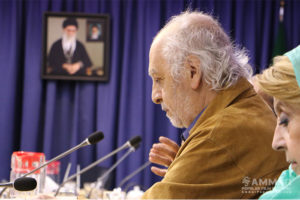
Miguel Littin in meeting with certain AIPFF organizers – Photo: Mohsen Eslamzade
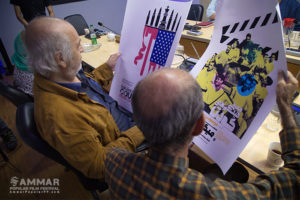
Miguel Littin the poster of the 3rd edition of AIPFF – Photo: Taha Jalilzade
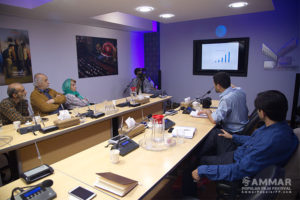
Miguel Littin in meeting with certain AIPFF organizers – Photo: Taha Jalilzade
